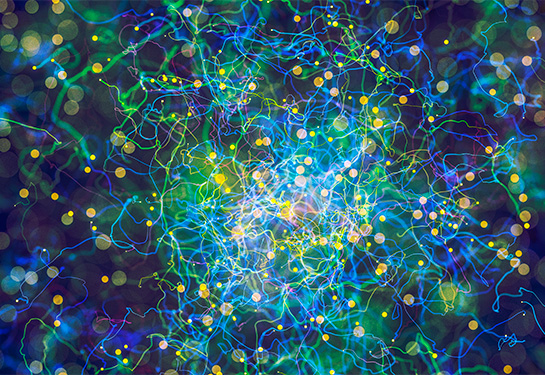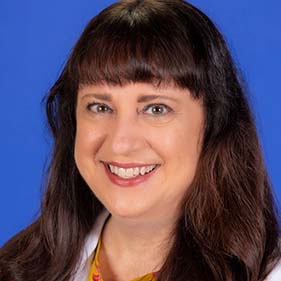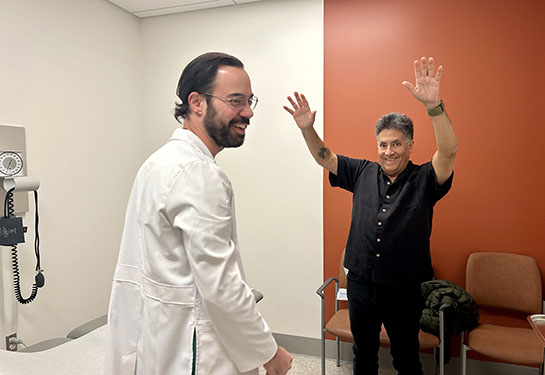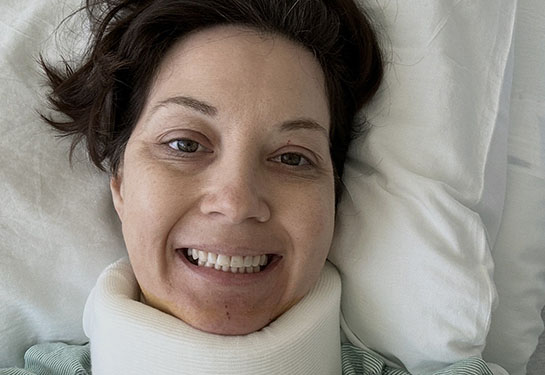UC Davis Health to open Advanced Psychiatric Therapeutics Clinic
Transcranial magnetic stimulation (TMS) and esketamine treatment modalities are available for patients with treatment-refractory major depressive disorder
The UC Davis Department of Psychiatry and Behavioral Sciences is opening a new clinic in Sacramento dedicated to treating patients with treatment-resistant major depressive disorder.
The Advanced Psychiatric Therapeutics (APT) Clinic will provide novel treatment modalities — transcranial magnetic stimulation (TMS) and esketamine nasal spray.
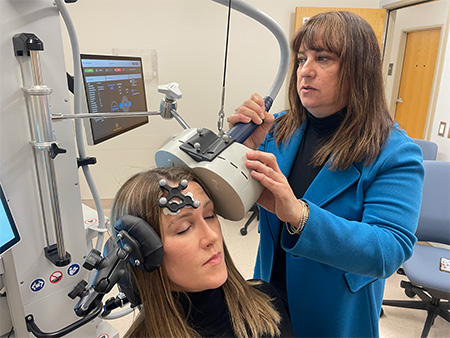
Electro-convulsive therapy (ECT) will also be offered through the APT Clinic in the near future.
The clinic opens at a time when medication and technology have made major improvements in recent years: Treatment response rates with TMS and esketamine are up to 70%, while ECT has shown up to an 85% response rate in patients with refractory major depression.
“Depression is one of the most common psychiatric disorders. It spans all life stages and can be debilitating and even life-threatening,” said Helen Kales, the Joe P. Tupin Professor of Psychiatry and chair of the Department of Psychiatry and Behavioral Sciences. “While antidepressant medications and therapy are effective in many patients, they don’t work for everyone.”
TMS and esketamine may offer hope for patients with treatment-resistant depression or those for whom antidepressant medications are only partially effective or intolerable. “These come with fewer side effects and impressive effectiveness. This is why we are excited to be able to offer these treatments to our patients,” Kales said.
The clinic, which is scheduled to open this winter, will be housed initially in the Ambulatory Care Center on the UC Davis Sacramento campus.
Eventually, the clinic will move off campus to a leased, 15,000-square-foot space at the Cannery Business Park in East Sacramento, just over a mile from UC Davis Medical Center. The larger facility in the Cannery is undergoing a $20-million renovation and is expected to open next year. The larger clinic will provide the ability for patients to participate in clinical trials, including psychedelics as a treatment for depression.
New strategies to address persistent mental health disorders
TMS uses magnetic fields to stimulate nerve cells in the brain to improve symptoms of treatment-resistant major depression. The FDA also approved TMS for obsessive-compulsive disorder (OCD) and migraines.
Although TMS was first approved for treatment in 2008, the technology has evolved and improved significantly since then, according to Debra Kahn, professor and clinical psychiatrist in the Department of Psychiatry and Behavioral Sciences and director of the new APT Clinic.
“Since its initial FDA approval in 2008, millions of TMS treatments have been delivered. Numerous published trials repeatedly demonstrate the efficacy and tolerability of TMS in depression,” Kahn said. “The literature also strongly supports TMS treatment for obsessive-compulsive disorder, and this is now an FDA-approved indication. More recent studies on TMS and pain are also very promising.”
The clinic will initially be capable of delivering 10 TMS treatments a day, with the ability to perform up to 20 per day in the near future. Patients generally receive daily treatments for the first six weeks, followed by a three-week taper phase in which the frequency is gradually reduced to once per week before treatment is discontinued. Treatment durations generally last from five minutes to 30 minutes, depending on the protocol prescribed for the individual patient.
New psychiatric interventions, including psychedelics and other novel neurotherapeutics, offer a lot of hope for people struggling with mental health disorders. Hope is great, but we need the evidence to back it up. With the new clinic, we will be able to evaluate the potential effectiveness of these new treatments for mental health disorders.”—Helen Kales, chair, UC Davis Department of Psychiatry and Behavioral Sciences
Esketamine nasal spray for depression
Esketamine, a nasal spray, is derived from ketamine. The Food and Drug Administration approved esketamine (brand name Spravato) in 2019 for treatment-resistant depression.
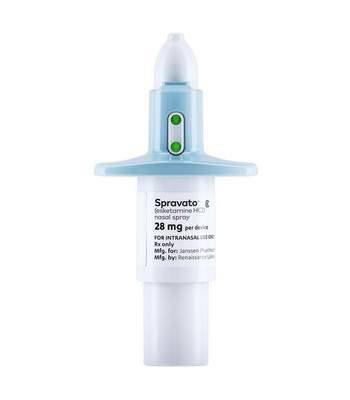
Ketamine can induce a dissociative experience in patients, who may experience a distorted sense of sight, sound and sensations. Because of these effects, it must be administered in a certified medical office where a health care provider can monitor the patient.
Research studies have shown that esketamine treats major depressive disorder with a response rate of nearly 70% and that these results can be rapid compared to other medications. In one study, esketamine demonstrated statistically significant effects compared to placebo on the severity of depression, and for some, the effect was seen as quickly as two days.
The new UC Davis Health clinic will initially deliver about 20 esketamine treatments per week and plans to gear up to around 50 per week. Patients will generally receive treatment twice weekly for the first month, once weekly for the second month, and once every one to two weeks for maintenance treatment.
Candidates for esketamine treatment are adults who have tried two other antidepressants without significant improvement and those with major depressive disorder with suicidal ideation.
In addition to Kales and Kahn, other TMS-certified psychiatrists providing care at the new clinic include John Onate, Lorin Scher, Amy Barnhorst and James Alan Bourgeois.
Two new faculty members have also been recruited. Kate Marder is a psychiatrist with extensive professional experience in TMS, ECT, and ketamine. Manpreet Singh is a psychiatrist who specializes in the neurobiology underlying mood disorders and related psychiatric conditions. Matt Settle, psychiatric nurse practitioner, will also be providing care at the APT clinic.
Depression research in the future
Once the clinic moves into the new Cannery location next year, it will offer expanded treatments, with more TMS machines and intravenous ketamine in addition to esketamine nasal spray.
The clinic will also engage in clinical trials, including investigations of new TMS algorithms that utilize functional neuroimaging to identify treatment locations, and surgical interventions for refractory major depressive disorder in concert with the Department of Neurosurgery. The APT clinic will also support trials of psychedelics and non-hallucinogenic psychedelic analogues, the latter in collaboration with the UC Davis Institute for Psychedelics and Neurotherapeutics.
Although there are many promising new treatments, the APT Clinic is taking an evidence-based approach to potential new therapies.
“New psychiatric interventions, including psychedelics and other novel neurotherapeutics, offer a lot of hope for people struggling with mental health disorders,” Kales said. “Hope is great, but we need the evidence to back it up. With the new clinic, we will be able to evaluate the potential effectiveness of these new treatments for mental health disorders.”
Resources

